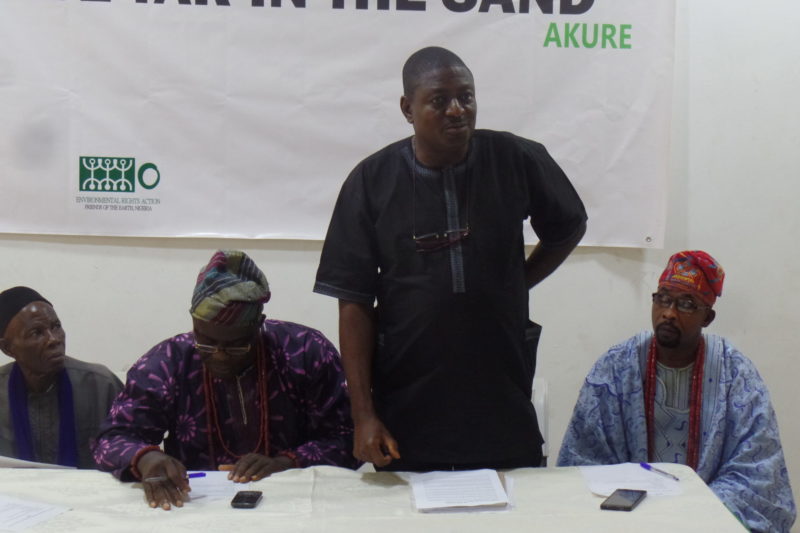The Nigerian government has been told to reconsider its bitumen exploitation ventures as the mining activity has the tendency to degrade the environment.

This submission formed part of a list of resolutions agreed on by participants at a recent forum in Akure, Ondo State, where the corrosiveness and dirty nature of bitumen extraction was decried.
At a Consultative Forum involving communities in the bitumen belt from Ondo, Edo and Ogun states held last month at the instance of the Environmental Rights Action/Friends of the Earth Nigeria (ERA/FoEN), government was told to halt any agreements with unknown companies, breaking free from fossils and explore safe and clean renewables that are cheap and community-driven.
They underlined the need for the convening of a national forum of bitumen communities with adequate representation from all communities that fall under the bitumen belt, adding that an institutional structure or agency that the communities can interface or engage with should be put in place.
They also want an updated geo-mapping and conduct of an Environmental Impact Assessment (EIA) study in the communities to address the genuine concerns of the communities.
“The Nigerian government should leave the tar in the sand to avoid the crisis in the Niger Delta repeating in the bitumen belt. Before bitumen extraction, there must be a review of the Mining Act 2007 to reflect existing realities and concerns by the local communities. There must be transparency and accountability in the entire bitumen belt,” reads a communique issued at the close of the gathering on December 22, 2016.
The communities, who say that there has been no consultation or formal agreements with them as the Federal Government ploughs deeper into its plans to exploit bitumen within their doorsteps, want the immediate commencement of the process of engaging them in a dialogue so as to create awareness and unity amongst them in their agitation for a better environment.
They likewise clamour for the clean up of Ogoniland as a first step and other communities across the country impacted by fossil fuels, pointing out that, in doing this, the government must ensure the protection of the people and the sustainability of a healthy environment.
The Nigerian bitumen deposit, put at some 42.74 billion metric tons, is said to be the second largest in the world. Discovered in 1900, it covers 120 kilometres costal belts of Lagos, Ogun, Ondo and Edo states.
Naturally occurring or crude bitumen is a sticky, tar-like form of petroleum which is so thick and heavy that it must be heated or diluted before it will flow. Bitumen is also mixed with granite to produce asphalt, which is the major product used for road construction.
Deputy Executive Director of ERA/FoEN, Akinbode Oluwafemi, explained that the meeting was called to examine new developments in the light of President Muhammadu Buhari’s plan to finally start bitumen exploitation and exploration.
In a presentation titled: “Time to Leave Tar in the Sand!”, Oluwafemi explained that despite all the government had said about diversification, the kind of diversification community people want in the energy sector is one that is clean, safe, community-driven and cheap. He noted, however, that bitumen is not any of these things since it is heavy crude and considered dirty energy.
During the deliberations that ensued, participants observed that:
- The Nigerian economy is still highly dependent on fossil fuels and this has given undue powers and influence to the extractive industry as government continues to place revenue generation above lives and livelihoods.
- Fossil fuels continue to pollute the environment and this continues to impact on livelihoods of the local people cause violent conflicts.
- In the planned extraction of bitumen the Nigerian government has not learnt from the examples of oil extraction in the Niger Delta where non consultation with locals has led to crisis, oppression and deaths.
- The Nigerian government is about to or may have signed contractual agreements with some new companies, and the contents of these agreements have not been made public.
- Like the earlier companies, the so-called new investors in the planned bitumen extraction have been meeting with communities and signing agreements with local communities that they understand nothing about.
- There are no institutional frameworks or structures in place to engage the communities. Such structures for engagement and interface must be located in the community.
- Environmental Impact Assessment (EIA) studies are yet to be carried out in the communities identified in the bitumen belt and, by` implication, there is lack of information on government’s plans to exploit bitumen. This is causing apathy among the people as they fear forced relocation.
- Examples abound that all forms of bitumen extraction leaves irreparable scar on the environment.
- The whole process of bitumen extraction, as currently ongoing, is devoid of transparency and accountability and shrouded in secrecy.
